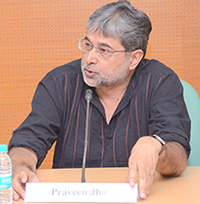 Praveen Jha, Chairperson, CIS&LS
Praveen Jha, Chairperson, CIS&LS
E-mail: chairperson_cisls@mail.jnu.ac.in; praveenjha2005@gmail.com
Praveen Jha completed his Ph.D. from Centre for Economic Studies and Planning, School of Social Sciences, Jawaharlal Nehru University and is currently a Professor in the same Centre. He is also the Chairperson, Centre for Informal Sector and Labour Studies. Prior to this he has also taught at St. Stephen's College, University of Delhi and at Lal Bahadur Shastri National Academy of Administration, Mussoorie. He has also been a Visiting Fellow at University of Bremen, Germany; Tianjin University of Finance and Economics Tianjin, China and Visiting Senior Research Economist at International Labour Organisation, Geneva. His areas of interest/specialization are Labour Economics, Agricultural economics, Development economics, Economics of Education, Resource Economics and History of Economic Thought.
Select Publications:
-
Progressive Fiscal Policy in India, (edited) Sage Publications, 2011.
-
Land Reforms in India - Issues of Equity in Rural Madhya Pradesh, (edited) Sage Publications, New Delhi, 2002.
-
Contested Transformations: Changing Economies and Identities in Contemporary India, (co-edited with Mary John and S.S. Jodhka) Tulika Books, 2006.
-
Agricultural Labour in India, Vikas Publishing House, New Delhi, 1997.
-
'Devil Take the Hindmost - Economic Reforms and Agricultural Labourers in India' Economic and Political Weekly, Vol. 32, Nos. 20 & 21, 1997.
-
'India After 1947: Promising the Moon', in Zubeida Mustafa (ed.) Asian Century 1900-1999, Oxford University Press, 2001.
-
'Poverty in Developing Countries: Stating a Longue Duree and Unfashionable Perspective', Working Paper No. 17, Institute for Human Development, New Delhi, 2003.
-
'Withering Commitments and Weakening Progress: State and Education in the Era of Neoliberal Reforms', Economic and Political Weekly, Vol. 40, No. 33, 2005.
-
'State's Growing Intolerance Towards Labour in India: A Note Based on Recent Developments', Indian Journal of Labour Economics, Vol. 48, No. 4, Oct.-Dec. 2005.
-
'Causes of Poverty in Developing Countries" in Paul Nkwi (ed.) Human Resource System Challenge IV: Poverty as part of the Encyclopedia of Life Support Systems, UNESCO and Oxford, U.K, 2005.
-
'Policies for the Marginalized in India: How Many Roads and Miles More Before they become Really Effective?' Labour and Development, June 2006.
-
'Fiscal Strains in the Era of Neoliberal Reforms: A Study of Uttar Pradesh', (With Subrat Das) in Sudha Pai (ed.) Political Process in Uttar Pradesh: Identity Economic Reform and Governance, Pearson India, 2007.
-
'The Well-being of Labour in Contemporary India Economy: What's Active Labour Market Policy got to do with it?' Economic and Labour Market Analysis Department, International Labour Office, Geneva, 2009.
-
'Labour Market Reforms in India: Barking up the Wrong Tree', (With Peter Auer) The Indian Journal of Labour Economics, Vol-52, No-1, 2009.
-
'Labour Regulation and Economic Performance: What do we know?' The Indian Journal of Labour Economics, Vol. 53, No. 1, Jan-March 2010.
-
'Imperialism and Primitive Accumulation: Notes on the New Scramble for Africa' (With Sam Moyo and Paris Yeros) Agrarian South: Journal of Political Economy, Volume-1, No.2, 2012
-
'Transnational Labor Migration, 1970s to Present' in Ness, Immanuel (ed.) The Encyclopedia of Global Human Migration, Willey Blackwell, 2013.
-
'Labour Conditions in Rural India: Reflections on Continuity and Change' in Carlos Oya and Nicola Pontara (eds.), Rural Wage Employment in Developing Countries: Theory, Evidence and Policy, (Forthcoming) Routledge, 2013.